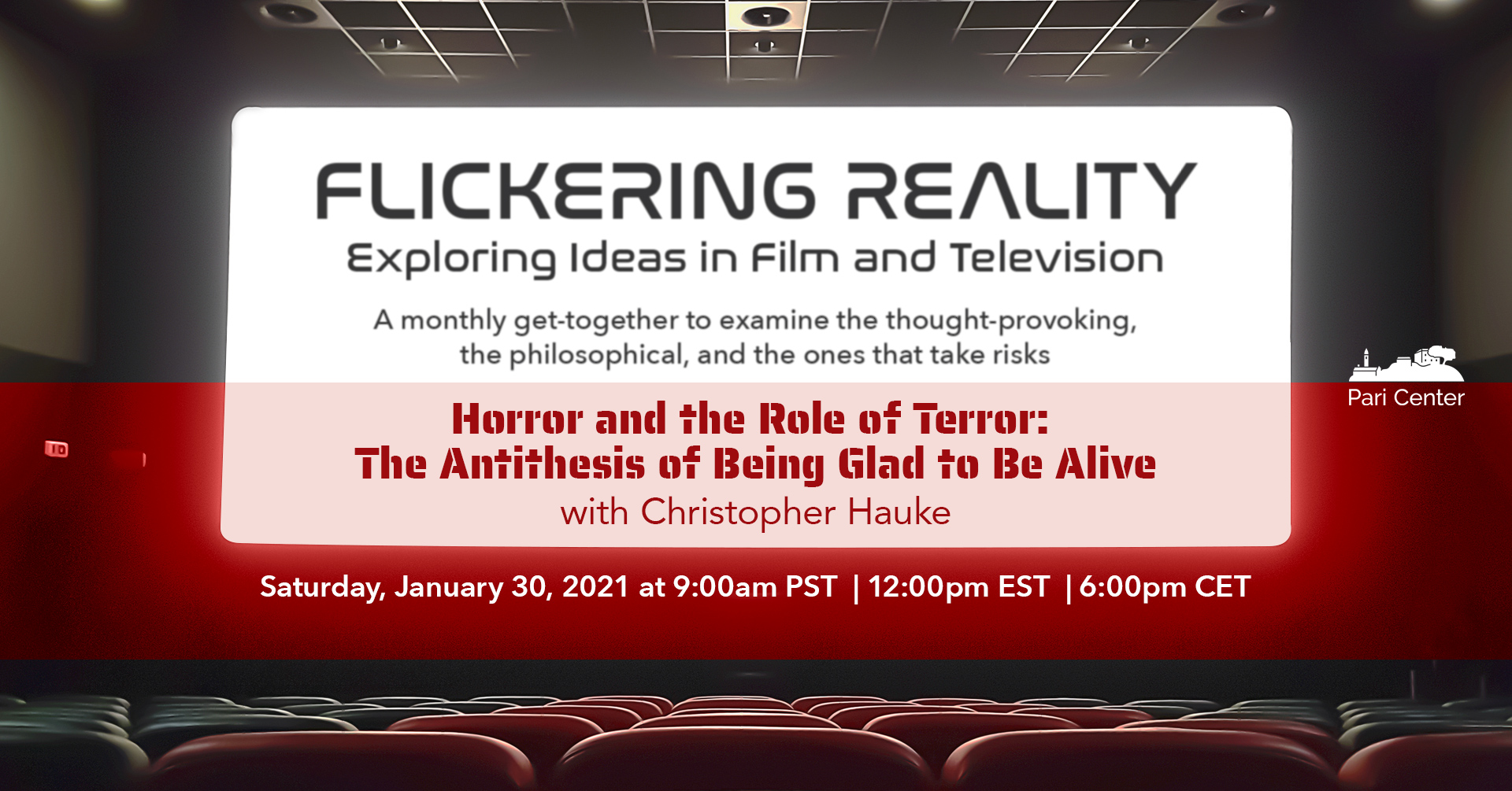Your cart is currently empty!

Horror and the Role of Terror: The Antithesis of Being Glad to Be Alive
- This event has passed.
January 30, 2021 @ 6:00 pm – 8:00 pm CET

Watch the recording
Flickering Reality: Exploring Ideas in Film and Television
Horror and the Role of Terror: The Antithesis of Being Glad to Be Alive
with Christopher Hauke
Saturday January 30, 2021
9:00 am PST | 12:00 pm EST | 6:00 pm CET
A monthly get-together to examine the thought-provoking, the philosophical, and the ones that take risks.
Would Christianity have taken off as successfully if Christ had been imprisoned and died out of sight? The horrific image of a nearly naked man, nailed to a cross and bleeding from his hands, feet, forehead and stomach has had greater impact. What is the relationship between horror, its images and the sublime?
From the ancient through the mediaeval to Victorian and contemporary forms of the genre, horror, and terror, have been used to impress upon us the frailty of humanity and, often, the value of a spiritual alternative. In one era, the paintings of Bosch or the original German folk tales could terrify their audience, while in the present day the horror film and its digital game equivalent offer a corresponding function.
Jung was aware of how myth and archetypal imagery took on modern forms when included in contemporary visual media—and yet the psychological impact remained. Jung maintained that evil was a real entity in the world. In their stories, horror writers and filmmakers rely on such an assumption. Christopher Hauke will be discussing a Jungian perspective on horror, the sublime and the role of terror with wide-ranging examples from literature and especially film. You may want to keep the light on…

Christopher Hauke is a Jungian analyst in private practice and Senior Lecturer emeritus at Goldsmiths, University of London interested in the applications of depth psychology to a wide range of social and cultural phenomena including film. His books include Jung and the Postmodern: The Interpretation of Realities, (2000); Human Being Human. Culture and the Soul (2005) Visible Mind. Movies, Modernity and the Unconscious.(2013). He has co-edited two collections of Jungian film writing: Jung and Film. Post-Jungian Takes on the Moving Image (2001) and Jung and Film II – The Return (2011).
His short films, documentaries One Colour Red and Green Ray and the psychological drama Again premiered in London venues and at congresses in Barcelona, Zurich and Montreal.
In addition to new film projects he is now researching the limits of rationality, and the place of the irrational in our lives.
This series is free and open to everyone!
Join our Zoom meeting via the following link: https://us02web.zoom.us/j/81879261698
If you would like to participate, have any questions or need any help just contact Eleanor Peat: eleanor@paricenter.com
Suggested reading:
Jung discusses evil in many passages. Start with Collected Works Vol. 9 Pt ii. Aion (orig. 1958). Chap. ll: ‘The Shadow’ paras. 13-19; and Chap. V: ‘Christ, A Symbol of the Self’ paras. 68-126
Here’s a good modern horror writer with archetypal qualities:
Ligotti, Thomas (2009) My Work Is Not Yet Done. Three Tales of Corporate Horror. London, Virgin Books.
How do we view horror films? Try this piece of research:
Johnston, Diedre D. (1995) ‘Adolescents’ Motivations for Viewing Graphic Horror. ‘Human Communication Research Vol. 21. Issue 4. Pp. 522-552. June 1995
A good article on film horror and its literary forebears:
Davis, Rhidian (2013) ‘Shadowlands and Roger Corman “The Poe Complex.”’ Sight and Sound. Vol 23. Issue 11. Pp 24-30. November 2013.
Books for further reading:
Hanich, Julian (2010/2011) Cinematic Emotion in Horror Films and Thrillers. New York and Abingdon: Routledge
Tan, Ed S., (2011) Emotion and the stricture of narrative film. Film as an emotion machine. New York and Abingdon: Routledge
Suggested viewing:
Try these quite recent horror films and think about their different styles:
Get Out (Jordan Peele, 2016. USA)
Ghost Stories (Dyson and Nyman, 2017. UK)
Triangle (Christopher Smith, 2009. UK)
What do Films and Television say about our world? What ideas can be examined through the moving image? From Science Fiction, to Comedy, Drama and Documentaries, the Seventh Art has been a mirror of our society, from the stories they portray to the method in which they’ve been produced, a mirror that is sometimes difficult to understand.
This monthly series will reveal the message behind different Films and TV Series, exploring the themes through the lens of physics, psychology, philosophy and sociology. Each session will have a guest speaker who will analyse these themes, which will then be discussed with our community, and lead us to a better understanding of film and reveal the deeper truths of our world.
